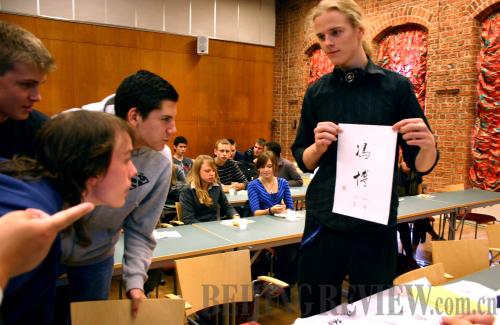|
 |
|
LEARNING CHINESE: A student in the Department of Chinese at Stockholm University shows his classmates his Chinese name written out by his teacher. The university and the Stockholm Confucius Institute host Chinese language-learning activities (ZHU LIANYI) |
On December 1, 2009, the Confucius Institute in Lyon, France, held a plaque-unveiling ceremony. Thomas Boutonnet, a Frenchman who has studied Chinese for 10 years in France and China and who is also an institute supervisor, said the institute would offer courses in Chinese language and culture covering legal, trade and cultural fields.
Gregory Lee, First Vice Principal of Université Jean Moulin-Lyon 3, said that because of trade with China, more and more French people are becoming interested in Chinese language and culture.
Confucius institutes are non-profit educational organizations promoting the teaching of Chinese and Chinese culture outside China, training language instructors and strengthening cultural exchange and cooperation between China and other countries. They also provide authentic language-teaching resources, including textbooks, to Chinese language learners all over the world and hold Chinese proficiency tests and examinations for the certification of Chinese language teachers.
The headquarters for Confucius institutes, located in Beijing, was opened on April 9, 2007. The Confucius institutes and their overseas study centers offer joint programs with local universities and secondary schools.
The first Confucius institute was established in Seoul in 2004. By November 2009, a total of 282 Confucius institutes and 272 Confucius classrooms had been set up in 88 countries, with a total enrollment of 230,000. Currently, more than 160 educational institutes in more than 50 countries have applications pending to host Confucius institutes, said Liu Yandong, State Councilor and President of the Confucius Institute Headquarters Council.
Preliminary statistics show that so far, approximately 40 million non-Chinese worldwide have learned Chinese as a foreign language.
Learning Chinese was very difficult, but he still enjoyed it, said Hamar Imre, head of the Confucius Institute at the Eötvös Loránd University in Budapest, Hungary. Upon learning of the Confucius institute, Luc Bendza, a famous movie star from Gabon, said that had there been such an institute earlier, he could have mastered the language before he studied kungfu in China many years ago. Bendza, now fluent in Chinese, learned the language while studying kungfu at Beijing Sport University.
Confucius institutes offer classes through multiple channels that are flexible in terms of time and venue. Online courses are accessible to people in 149 countries and regions. The headquarters of the Confucius institutes also cooperate with China Radio International in opening12 broadcast institutes in countries such as Japan, Russia and Kenya.
In addition to language teaching, the institutes also offer community outreach programs, which introduce culture, life styles and travel in China.
"More and more Americans want to learn not only the Chinese language, but also the Chinese way of thinking and values," said Sheree W. Willis, Executive Director of the Confucius Institute at the University of Kansas.
The university, with a 50-year history of teaching Chinese, established a Confucius institute in 2006, which not only offers Chinese language courses on campus, but also delivers them to secondary and primary schools and local companies. The tailor-made program is popular with local universities, Willis said.
More than language
Confucius is one of history's greatest thinkers, teachers and social philosophers. During his lifetime, Confucius traveled extensively to disseminate knowledge and promote mutual understanding.
A U.S. House of Representatives resolution passed in October 2009 honored the 2,560th anniversary of the birth of Confucius and recognized his invaluable contributions to philosophy and social and political thought. The resolution acknowledged that the teachings of Confucius that say "what one does not wish for oneself, one ought not to do to anyone else; and what one recognizes as desirable for oneself, one ought to be willing to grant to others," is a model for ethical behavior and for the promotion of harmony among people.
Many directors of Confucius institutes believe the institutes are doing the same thing Confucius did more than 2,000 years ago.
"Confucius taught us to be good people and to do good things; and to make the world peaceful, everybody should be responsible for their own actions," said David Mials Holm, professor with the Mandarin program at the University of Melbourne. The institutes are following the example of Confucius, he said.
Liu Quansheng, head of the Confucius Institute at the University of Maryland, the first such institute in the United States, said China's rapid economic development has attracted Americans to study Chinese. "Americans are interested in the essence of the Chinese culture with its values of harmony and peace."
Some Americans do not welcome the institutes, believing that they are cultural intrusion from a rising China and worry about conflicts between the two civilizations. That perception originated from a misunderstanding of Chinese culture, Liu said.
Liu was very happy to learn the U.S. House of Representatives had passed the resolution commemorating Confucius' 2,560th birthday. This indicates China and the United States share many common values, and shared cultural values help boost relations between the two countries, Liu added. | 